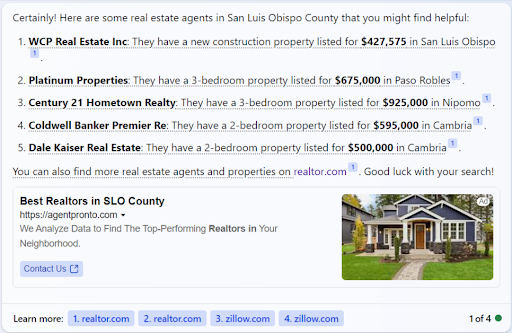RE Technology recently published an amazing article about what happens when you as AI Bots to recommend a realtor. Here is a reprint of the article in case you missed it.
We Asked 6 AI Bots to Recommend a Realtor. Here’s What Happened
ChatGPT hit the scene in a big way this year, and ever since, people have been asking it all sorts of things — everything from explaining complex topics to home maintenance tips to recommendations for books or movies.
That got us thinking — what happens when someone asks ChatGPT (or similar AI models) to recommend a real estate agent to them? And is this a marketing channel that agents should start thinking about?
To find out, we asked six AI chatbots the same question: I’d like to buy a house in San Luis Obispo county. Can you recommend Realtors to me? Here’s what we found.
ChatGPT
We started with the most well-known chatbot, ChatGPT. And, well, we struck out. Here’s the answer we received:
I’m sorry, but I don’t have real-time access to databases or the internet, so I can’t provide specific recommendations for real estate agents or Realtors. However, I can offer some general advice on how to find a good Realtor in San Luis Obispo County or any other area…
We got the same exact response — to the letter — from Poe by Quora, which uses OpenAI’s dataset. OpenAI owns ChatGPT, so we’re not completely surprised by the similar answers.
Fortunately, those two chatbots are the only two on our list without real-time access to the internet. That means our journey is about to get a lot more interesting…
Bard
Google’s Bard chatbot harnesses the power of Google search, but it has yet to attain the same popularity as ChatGPT. However, of all the AIs, it gave us the most complete response. Not only did it provide a photo for each of the five agents it recommended, but also a link — three from LinkedIn, one Realtor.com agent profile, and one agent website, underlining the importance of maintaining a strong online presence.

Bing
Bing, the Microsoft-owned search engine, now offers an AI-assisted search option. When we asked it to recommend an agent, it offered a succinct list of five options. Only one was a real estate agent, however. The four other suggestions were brokerages, which may indicate that brokerages in our area have more time and budget to invest in their web presence than local agents.
Interestingly, Bing provided a link and an example of a current listing for each suggestion.

None of the links, though, directed us to that listing or even to the brokerage’s or agent’s website. Instead, each link sent us to a generic Realtor.com property search for our area. In order to contact any of the listed real estate pros, we’d have to Google (lol, sorry, Bing) them ourselves.
Also, every link featured an ad above it, which was far easier to click on than the actual link. So if you’re looking for a new place to advertise, perhaps buying ads for similar queries on Bing is worthwhile, especially for brokerages or teams — or for agents who don’t have yet a strong enough online presence to be selected for an AI recommendation.

ClaudeAI
ClaudeAI, which was founded by OpenAI alumni and has investors in Google and Amazon, offered the most straightforward answer. It gave us plain text with no links or images, and a bit of homespun (lab-spun?) advice for finding an agent. Thanks, Claude.

Perplexity AI
Perplexity AI offered up five suggestions, only three of which were actual real estate pros — one agent, one real estate team, and one brokerage. The other two answers were websites (FastExpert.com and US News) that simply list agents in our area. Not exactly a recommendation — more like a recommendation to a place that kinda-sorta offers recommendations. Thanks, but no thanks.
Let’s disregard those two suggestions and look at the actual working professionals that Perplexity recommends. Each response comes with a link, but none of those go to an agent or company website. Instead, two links went to a broad search for local agents on Yelp, and one went — somewhat oddly — to this page on Google Maps. To finish things off, Perplexity threw in some random listing photos from the aforementioned sites for good measure.

So What Did We Learn?
Like most things related to AI chatbots, it’s a work in progress. While we don’t yet know if or when consumers will rely on chatbots to find a Realtor, agents who wish to prepare for that scenario should invest effort in ensuring their business can be found across a wide array of places online.
Here is a list of actions to take, based on where the chatbots we queried pulled information from:
- Realtor.com links were very popular with the chatbots we surveyed. Make sure you have a complete agent profile there, including contact info and client testimonials. While no Zillow, Trulia, or Homes.com links were offered this time, tend to your profiles there, too, as there’s no telling when a tweak to chatbot technology will change things.
- Claim your Yelp page, if you haven’t yet done so, as some chatbots reference this site.
- LinkedIn was a major recommendation source for Bard, and was the only social media site consulted by the bot. Make sure your profile there is complete, and optimize it for SEO to increase the likelihood of being found.
- Make it a habit to ask for reviews from clients. Perplexity AI specifically mentioned that each of the real estate pros it recommended were highly rated. It also referenced Yelp, while both Bing and Bard pulled information from Realtor.com. Try to get as many reviews as you can in as many places as you can: portals, Google, Yelp, your website, etc.
- Make it a long-term goal to establish your agent website as a local real estate source. The one agent website that was linked to in this experiment belongs to a local Realtor who has spent considerable time and effort into building his site as an authority. He offers market updates, a podcast, resources for each community he serves, customer reviews, and more. Regularly update your site with quality content, and link to it anywhere you can: social media, portal profiles, your email signature, marketing materials, and more.
Essentially, the key to being recommended by AI is having a broad internet presence. We can’t be sure fro where it will pull information, especially as the technology is updated, so having a well-maintained online presence seems crucial to catching the attention of AI.
But don’t stress too much about it. After all, the number one way consumers find their agent is still satisfyingly old-fashioned — by asking family and friends.




